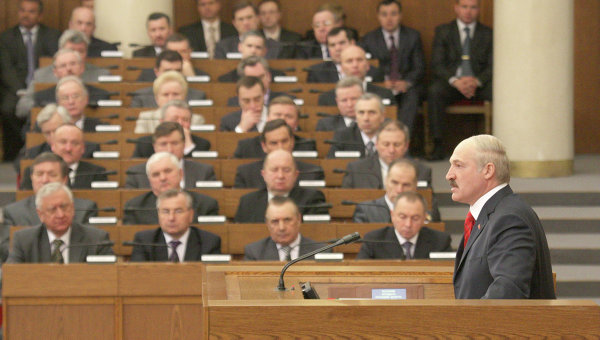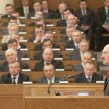
Belarus: A Countdown Toward Political Change?
Publication: Eurasia Daily Monitor Volume: 10 Issue: 4
By:

In 2012, Belarus was recovering from the financial crisis, the peak of which was in summer 2011. The achievements along this line have been the international trade surplus, the 20-percent growth of personal incomes (throughout 2012), and a relatively stable exchange rate of the Belarusian ruble—in contrast to its devaluation to one-third of its former value during 2011.
More problematic has been the price paid for these achievements. Thus, exports have grown largely due to a devaluation of the Belarusian ruble and also due to a loophole in bilateral agreements with Russia. Namely, Belarus was able to earn about $2 billion during the first six months of 2012 for exporting paint thinners and solvents produced from Russian oil while avoiding paying export tariffs to the Russian treasury. When Russia closed the loophole, exports declined. The rise of wages exceeded the growth of labor productivity and would therefore be difficult to sustain. Perhaps even more important is the fact that the government sets targets for the growth of wages instead of helping create conditions for their growth. This is a throwback to central planning, Soviet style. And so is nationalization of some private businesses like two confectionaries in Minsk and Gomel. This practice sends a negative signal to potential private investors (https://naviny.by/rubrics/economic/2012/12/29/ic_articles_113_180359/). Perhaps the most controversial was Presidential Decree No. 9 of December 7, 2012, according to which the employees of wood processing plants cannot resign without the chief manager’s permission throughout the realization of the plant’s modernization project (https://www.belta.by/ru/articles/officially?cat_id=1528). This decree prevents labor migration to Russia but is dubbed by independent observers a “return to serfdom” (https://izvestia.ru/news/540689; https://redhotrussia.com/belarus-feudalism-lukashenko-new-law/).
The economic projections of the Belarusian government for 2013 are optimistic. It is expected that economic growth will amount to 8.5 percent (whereas only two-percent growth was recorded from January to November 2012); foreign investment is expected at the level of $4.5 billion (compared with $1.22 billion in 2012); exports are projected to rise by 15.2 percent; and 6.5 million square meters of new housing is expected to be commissioned (compared with 3.9 million square meters in 2012). Independent observers are skeptical about these targets. After all, in 2013 Belarus will have to repay $3 billion to international lenders. The only way the above projections could be approximated is through acquiring new loans and new investment from Russia (https://naviny.by/rubrics/economic/2013/01/03/ic_articles_113_180400/).
In the area of domestic politics, several 2012 events are worth mentioning. Two alleged perpetrators of the terrorist attack on the Minsk subway (in April 2011) were executed in March. Andrei Sannikov, one of the 2010 presidential hopefuls, was released from prison in April. No significant public protests or flash mobs were recorded. And for the most part, voices of the opposition moved to the virtual Internet sphere as opposition leaders have taken almost exclusively to blogs—rather than street rallies or other “events”—to air their political positions. The parliamentary elections of September 23 determined 109 members of the Belarusian House of Representatives, 60 percent of which are members of the pro-government movement White Rus and none represent the opposition. The voter turnout has been hotly debated, but the independent pollsters delivered a result (66.4 percent) that was closer to what the government claimed (74.6 percent) than to the pronouncements of the opposition (see EDM, October 30, 2012).
A major change occurred in the relationship between the dynamics of Belarusians’ personal incomes and President Alyaksandr Lukashenka’s popularity rating. Until 2012, there was a close correlation between these two variables, and in 2011 both reached a nadir. Yet, a significant rise of incomes from the lowest point associated with the 2011 financial crisis has not resulted in a proportional rise in Lukashenka’s rating. No more than 30 percent of Belarusians would like to vote for him if the elections were held “today,” according to the September 2012 national survey by the Independent Institute for Socio-Economic and Political Studies. It remains to be seen if the erstwhile dependency of Lukashenka’s rating on Belarusians’ perception of their economy will be reestablished (https://naviny.by/rubrics/opinion/2013/01/02/ic_articles_410_180391/).
In the area of international politics, a major event was the joint recall of the EU countries’ ambassadors from Minsk on February 28. It occurred after the Belarusian Ministry of Foreign Affairs recommended that the ambassador of Poland and the envoy of the European Commission leave Minsk for consultations. In its turn, that recommendation followed the extension of the list of Belarusian officials banned from entering the EU. The ambassadors returned at the end of April after two political prisoners, Andrei Sannikov and Dmitry Kovalenko, were released from jail. Beyond that, no major concession was wrested from the Belarusian government in the area of democracy and human rights. That means that a significant aid package from Russia has been affecting policy-making in Belarus throughout 2012. According to Yaroslaw Romanchuk, a 2010 presidential hopeful, this package exceeds what Israel has been receiving from the United States (https://naviny.by/rubrics/opinion/2012/07/25/ic_articles_410_178583/). Lukashenka has succeeded in gaining tangible economic benefits in exchange for supporting Vladimir Putin’s plan for establishing an integrated Eurasian Community. Under this condition the possibility of the West to exert influence on Belarus is diminished.
Alexander Milinkevich, a 2006 presidential hopeful who did not run in 2010, believes that the EU should not fixate on Lukashenka. Rather, it should eliminate the “visa barrier” for ordinary Belarusians, as nothing exposes them to the advantages of the “European choice” more effectively than trips to the EU countries (Deutsche Welle, January 3, 2013). Considering the possibility of political change in Belarus in the foreseeable future, it is noteworthy that even the major official daily of Belarus weighed in with the reasoning in favor of cultivating a “constructive” opposition in Belarus. Even the fact that the current “radical” opposition, which Lukashenka calls the fifth column, depends on Western grants has found explanation in that article: “People gain livelihood the way they can. However lofty the ideals the members of the opposition profess, they cannot exist on an empty stomach” (https://www.sb.by/post/140006/). By all appearances, therefore, political change will arrive in Belarus on its own schedule, not according to the plans set in Washington, Brussels or even Moscow.




